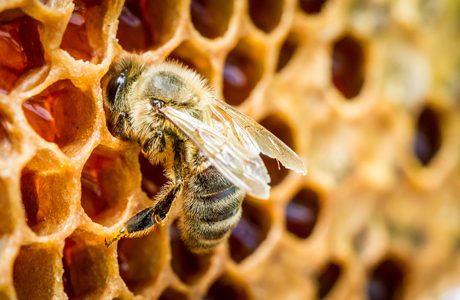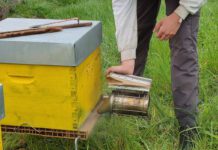
Planting bee-friendly flowers and cutting grass less often are among five simple steps the public are being urged to take to help our precious pollinators thrive—as, despite public concern about bee populations, more than half of those asked say they have not taken any pollinator-friendly actions in the last year.
In a recent YouGov poll, almost a quarter of English adults (24%) said their household had planted pollinator-friendly plants in gardens or window boxes to encourage pollination, and a fifth had let areas of their garden grow wild to give bees enough nectar and pollen. However 57% said their household had taken no action to provide bees and other pollinators with food and homes.
Bees’ Needs week (9 – 17 July) calls for green-fingered growers—from window box gardeners to farmers—to act now to protect the 1,500 species of insects that pollinate plants in the UK, including bumble bees, honey bees, solitary bees, hoverflies, beetles, butterflies and moths.
Speaking ahead of Bees’ Needs week, Defra’s Lords Spokesman, Lord Gardiner of Kimble, said:
“It is clear we care about bees—now we need to make sure we translate that concern into real action to protect our precious pollinators.
“Everyone can play their part to ensure bees have food and a home, from urban window box gardeners to farmers protecting the wildlife around their fields.
“You do not have to be an expert gardener to make a difference: our Bees’ Needs campaign sets out five simple actions we can all take to help pollinators thrive, like cutting grass less often or planting pollinator-friendly flowers.”
Pollinating insects are essential to maintain the exciting variety of plants and wildlife in the UK, and play a vital role in food production: research estimates their value to crops at approximately £600 million due to improved productivity. Due to changes to the landscape over the last century, not all pollinators can find the food and shelter they need.
Bees’ Needs Week, which kicks off today in partnership with organisations including Friends of the Earth, the Bumblebee Conservation Trust and Royal Botanic Gardens Kew, sets out five simple actions everyone can take to give pollinators food and a home.
Five simple steps to meet Bees’ Needs
Grow more flowers, shrubs and trees rich in nectar and pollen
Leave patches of land to grow wild
Cut grass less often
Avoid disturbing or destroying nesting or hibernating insects
Think carefully about whether to use pesticides
With the summer break around the corner, schoolchildren are being given a holiday challenge: to build a bee hotel to provide homes for some of the 260 species of solitary bee that nest in hollow plant stems, holes in cliffs and crumbling buildings.
Paul de Zylva, Senior Campaigner, Nature and Eco-system security at Friends of the Earth, said:
“You don’t need to keep bees to be a bee-keeper. At home, in your street, at work or at school, you can help the 250 or more different types of bee by growing the right plants, improving local spaces for pollinators and avoiding pesticides. Simple actions can make sure we are the generation to save Britain’s bees.”
Stephen Trotter, Director for The Wildlife Trusts England, said:
“Bees’ Needs Week is a great way of doing something positive for this important group of insects. Bees are fascinating and beautiful in their own right and they also do lots of work that benefits people, for free. There’s much more to bees than making honey. I’ll be building a bee hotel but whatever you do, everyone can make a real difference to the future of these charming animals.”
Gill Perkins, Chief Executive Officer for the Bumblebee Conservation Trust said:
“Bumblebees and other pollinators are among familiar and much-loved insects that pollinate our crops and wildflowers. We can all make a difference and gardening for bumblebees is one of the most effective ways to help their populations. Whether you have a garden, a window box or even a potted plant, we can all help by planting bee-friendly flowers.”
Bees’ Needs Week forms a key part of the wider National Pollinator Strategy, launched in 2014 by Defra in partnership with charities, businesses and academic institutions. Since the launch £65,000 has been awarded through the Landscapes for Wild Pollinators Initiative to three important projects helping farmers and landowners create and protect pollinator-friendly habitats. Defra has also awarded £20,000 to fund Local Nature Partnership pollinator projects in five areas across the country.
Pollinators in numbers
1,500 species of insects pollinate plants in the UK, including bumble bees, honey bees, solitary bees, hoverflies, wasps, flies, beetles, butterflies and moths.
25 species of bumble bee, 260 species of solitary bee, 1 honey bee species and hundreds of types of hoverflies, butterflies and moths live in the UK.
70 of the 100 crop species that provide 90% of food worldwide are pollinated by bees.
£600m is the estimated value of insect pollination to crops due to increases in yield and quality of seeds and fruit.
6.5kg of ‘Whitehall Honey’ produced by the first yield from Defra’s beehives in 2015.
5 simple actions the UK public can take to protect our vital pollinators: grow more flowers, shrubs and trees; leave patches of land to grow wild; cut grass less often; don’t disturb insect nests and hibernation spots; and think carefully about using pesticides.
Get involved
Follow #BeesNeeds on twitter to find out more about the campaign and tweet your pollinator questions to charities, businesses and bee experts throughout the week.
Build a bee hotel to provide homes for some of the 260 species of solitary bee that nest in hollow plant stems, holes in cliffs and crumbling buildings—find out how in our video tutorial at www.youtube.com/DefraUK.
Attend a host of events being held by partners across the country—join the Bumblebee Conservation Trust for a Bumblebee Safari in Somerset; attend the first Chester Bee Summit at Chester Zoo; or join the Wildlife Trusts’ Butterfly Walk at Trench Wood in Worcestershire—hundreds of pollinator-friendly events are taking place across the UK all week.







